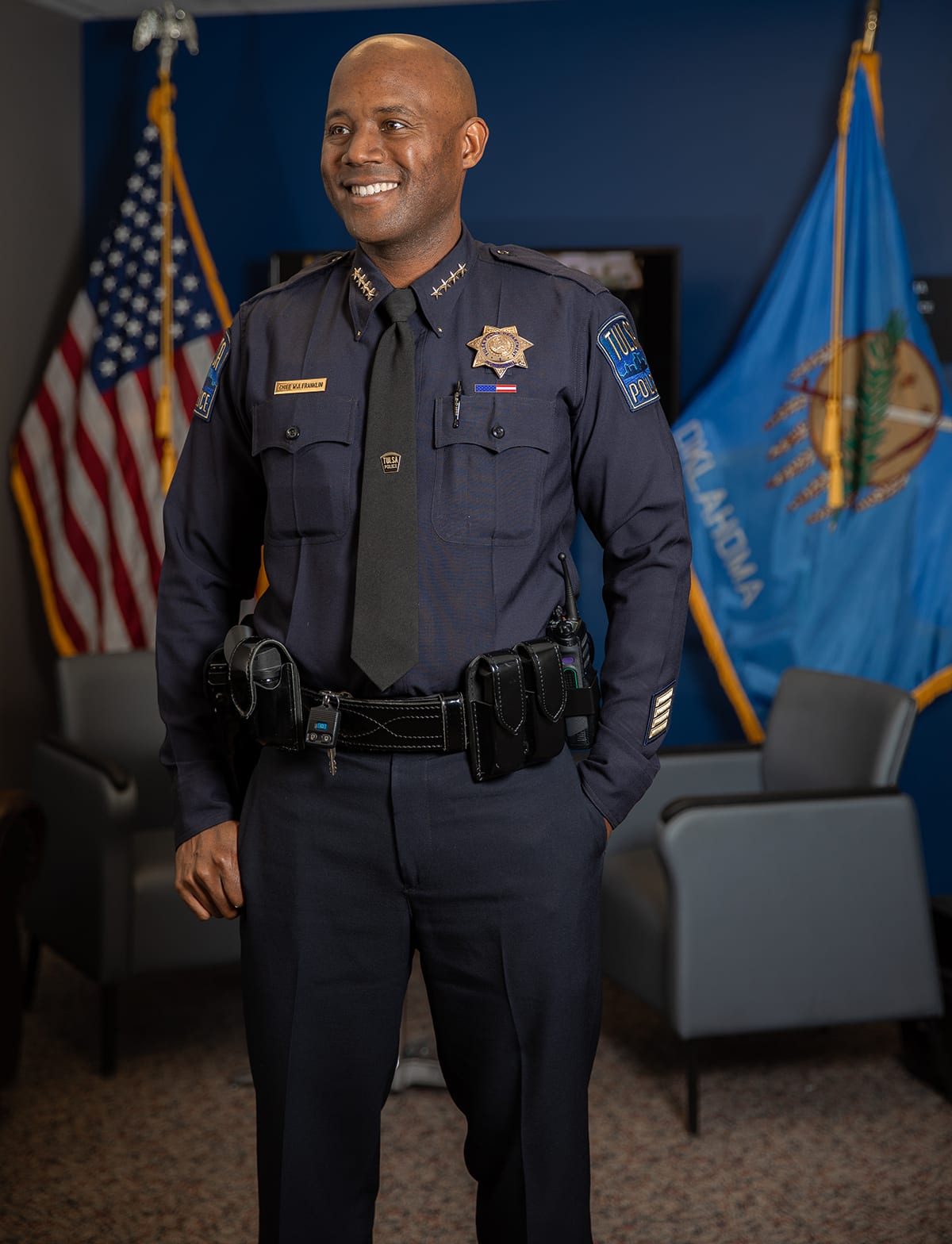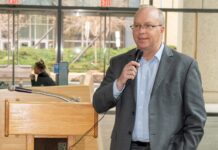After 23 years as a Tulsa police officer, detective and supervisor, Wendell Franklin became the department’s chief in February. The first African-American to hold that position in the city’s history, he is a born-and-raised Tulsan who is optimistic about positive change. We caught up with Franklin and got his thoughts on …
… his background.
I bring a historical perspective to the job. I know how Tulsa used to be and I know how Tulsa is now and where it’s trying to go. I’ve risen through the ranks and had the opportunity to go through notable leadership trainings. I bring a business perspective to the police department. In the private sector, if businesses don’t change and adapt to their markets, they will be mothballed. Police departments are no different. The American society is in a state of constant change and law enforcement should be no different.
… community policing.
Community policing came natural to me as I attained higher ranks. It was the easiest way to solve neighborhood-business problems. The concept is not difficult and involves both sides working together to solve crime and, even more so, quality-of-life issues. Many Tulsa police officers do it; it’s just not formalized, which is what we’re working on implementing. As a child, I lived in a community in which we all survived by relying on one another and working together. We would go next door to our neighbor and ask for whatever we needed. We looked out for one another. It’s a concept rarely in play today. This concept shows we, as humans, can’t do things alone and we as police officers can’t police a community alone. Look at the great success of our homicide detectives – their clearance rate is not just because they’re outstanding detectives, but also because the community gets involved when a life has been taken. The tips we receive from Crimestoppers point us in the right direction to solve homicides and other serious crime issues.
… self-reflection as an asset.
I constantly re-evaluate myself and question my purpose. I never want to commit to something and fall short. I attempt to examine everything in intricate detail. This is both good and bad because sometimes it causes hesitation and/or moving at a slower pace than others may desire. With that, I’m also careful with what I say because I know how things can be misinterpreted and taken out of context. This has already occurred in my short time as chief. Every assignment I’ve had at TPD I’ve approached the same. I, like most everyone, am tough on myself and that self-examination keeps a person grounded and focused appropriately.
… a hidden passion.
I’m a huge fan of history. I listen to podcasts and read. I particularly love the World War II generation and view it as the greatest generation. If you step back and look at the insurmountable odds the United States overcame to defeat Axis forces, there would be little argument with my view. I sometimes find myself contemplating if today’s society has the same fortitude.
… avoiding cynicism.
I pray and I have a lot of close friends outside the police department who nurture me. I have a very supportive wife and family who have stood beside me my entire career. While in patrol and working investigations, I saw a lot of death and violence our society inflicts upon one another. It’s a struggle to ensure I have the proper work-life balance; every officer struggles with it. From a physical perspective, having an opportunity to work out allows me to decompress. It’s a big part of my normal routine.
… short-term goals.
We have to get plans in place to tackle violent crime, community policing and technology. We have some semblance of two of the three, but there is room for improvement. Our department can’t just verbalize plans; they must be documented and we have to refer back to the plans to ensure we’re on track. I also want the department to be transparent by putting out data and having a more robust appearance in social media.
… long-term goals.
Our officers are well-trained experts in law enforcement. This is great, but I also want to see our officers, as they ascend through the ranks, have other leadership training opportunities outside of just policing. Our leadership, including me, is not accustomed to a lot of the current business models and philosophies. This hinders planning and growth and causes us to lag. Long term, we must develop our leadership for the future of the Tulsa Police Department. We must also take into consideration how young our department is becoming as we continue to add officers.
… five adjectives he’d use for himself.
Perfectionist; driven; funny; creative; meticulous.
… five adjectives others would use.
Perfectionist; tense; comical; quiet; particular.
… symmetry with historian John Hope Franklin.
I don’t believe in examining my life to anyone’s. Those who have forged pathways in history are deserving of such distinction, and their plights rarely come to fruition during their lifetimes. I have not endured what others before had to endure and I don’t consider my circumstance to be worthy of comparison. While it’s true this is a historic occasion for Tulsa, it is only based on my race and not my works; perhaps future accomplishments will add more credence to the simple historic event. For clarity, few football aficionados remember the first black quarterback in the NFL; however, everyone knows the first black quarterback to win the Super Bowl – Doug Williams.


























